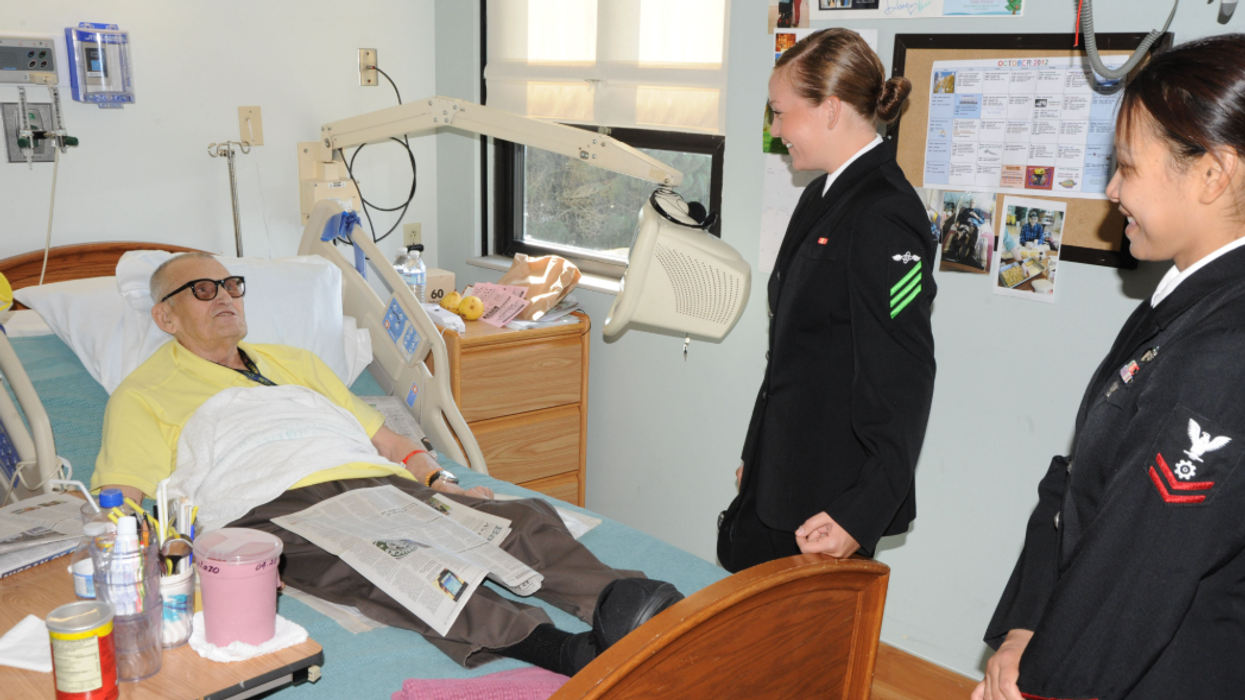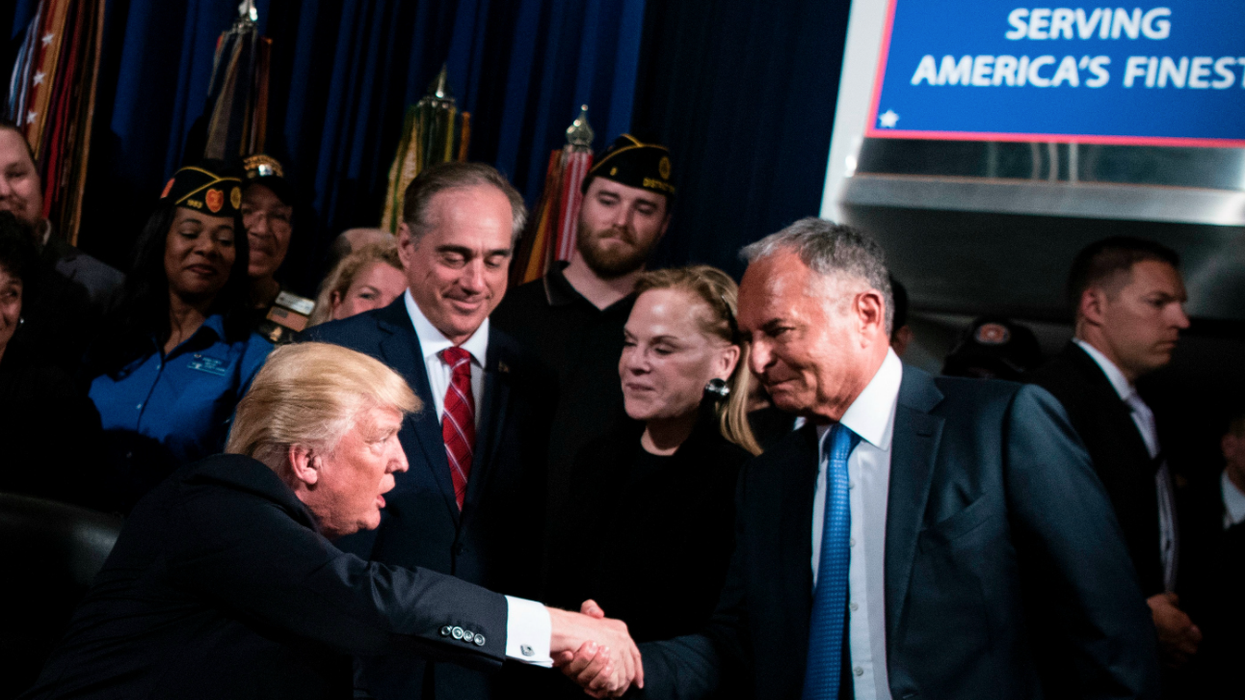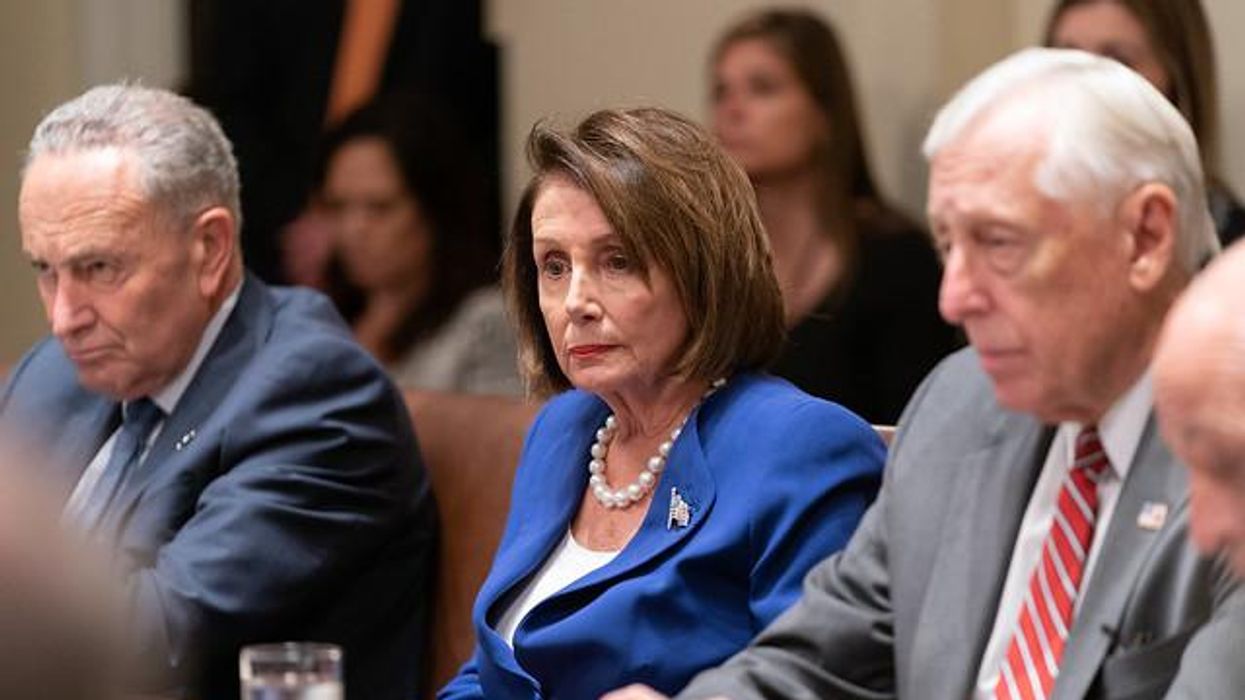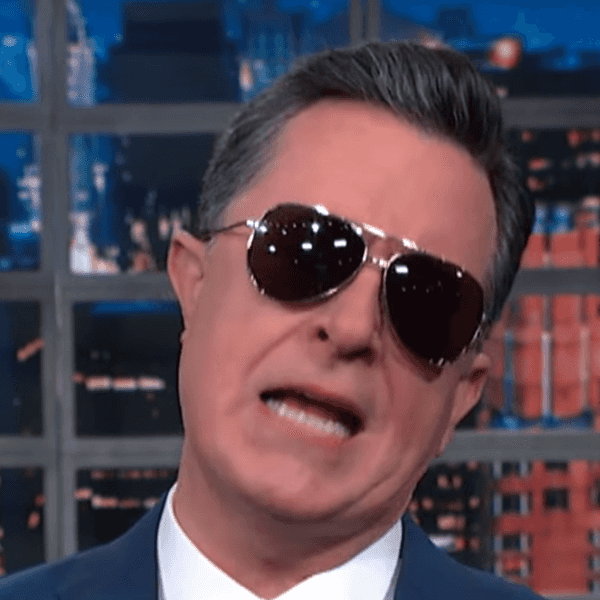Why Trump's Scheme To Cut And Privatize Veterans' Health Care Will Fail
You would think protecting veterans’ access to health care would be sacrosanct in the current political environment.
So how can we explain the Trump regime wielding a budget axe at the Veterans Health Administration? The agency – the largest health care system in America – is in the process of eliminating 30,000 jobs for physicians, nurses and other personnel. That’s nearly one of every 12 employees at the VHA, which is responsible for delivering health care to over nine million veterans.
In recent weeks, Veterans Affairs Secretary Doug Collins, a former Georgia Congressman and military chaplain, cancelled every union contract with the VHA’s physicians, nurses and other employees. This came after the Baptist minister-turned-politician sent letters to VHA workers encouraging them to either retire or look elsewhere for work. Morale at the agency is plummeting.
These were only the first steps in the Trump regime’s plan to dramatically downsize the VHA during his second term in office. The 2026 budget he sent to Capitol Hill called for spending more than a third of the VHA’s $115 billion budget on outside physicians and other private providers. That’s a nearly 50 percent increase over previous outsourcing, a move that some progressive Democrats in Congress are calling the stealth privatization of the VHA.
“They want every employee to be pushed out so they can decimate the VA’s workforce,” Rep. Delia Ramirez (D-IL) said during a July House Veterans Affairs committee meeting. It “wants them to leave” as part of its plan to privatize services.
The Trump regime’s escalation of VHA privatization extends a decade-long trend. It began in 2014 after a Phoenix VHA administrator was accused of under-reporting appointment wait-times in the reports sent to Washington. (No other health care system reports wait-times. If they did, the VHA would probably look good by comparison.)
Ensuing demands that veterans be allowed to access private-sector providers led to passage of the 2014 Choice Act, signed into law by President Barack Obama. The law launched pilot projects in rural and under-served areas that, while allowing for outsourcing, limited it to situations where the local VHA facility was more than a 30-minute drive from the veteran’s home, or, the facility could not schedule an appointment within 20 days for primary or mental health care or within 28 days for specialty care.
The program became system-wide with passage of the 2018 Mission Act, which also had bipartisan support. Though touted as a major benefit for the 25 percent of veterans who live in rural areas, the bill broadened the criteria to include instances where veterans and their VHA physicians thought it was in “their best medical interest.” But they needed a second opinion to that effect. Earlier this year, VA Secretary Collins removed the second opinion requirement.
No choices
But is “choice” helping rural veterans? Earlier this month, The American Prospect reported on a comprehensive survey by the Veterans Healthcare Policy Institute that questioned private providers’ ability to serve the needs of the 2.8 million rural veterans enrolled in the VHA. The “analysis reveals a system that cannot provide even basic medical and mental health services to non-veteran patients,” Suzanne Gordon, co-founder of VHPI wrote. “Hundreds of hospitals in America’s rural counties and under-served areas have curtailed critical services or closed entirely. And thousands of counties across America are experiencing significant health provider shortages.”
Things are likely to get a lot worse over the next several years as millions of rural residents on Medicaid or Affordable Care Act insurance plans lose coverage due to the cutbacks recently signed into law. “President Trump, VA Secretary Collins, and Republicans in Congress want to send more veteran patients into an already troubled private-sector system, while depleting that system of the resources necessary to absorb this extra load,” Gordon wrote. “The idea that this will work well is shaped more by ideology than reality.”
If helping rural veterans is the goal, a far more fruitful approach would be shifting VHA resources into the areas where most veterans now live. The system rapidly expanded during the quarter century after World War II to serve the needs of veterans who, for the most part, hailed from urban areas. The system’s 170 hospitals are located mostly in large and medium-sized metropolitan areas.
The VHA also staffs almost 1,200 outpatient facilities. Unfortunately, most rural areas remain poorly served by these clinics. Many rural counties have none. This should come as no surprise. Residents of these areas often have to drive an hour or more to access pharmacies, grocery stores and other retail outlets. Accessing medical services, whether public or private, often involves even longer drives.
Moreover, rural hospitals, which would be a logical place for providing additional services for veterans, are also dying. There simply aren’t enough patients in sparsely populated areas to support comprehensive medical services. The idea that the private sector can meet the special needs of veterans, who suffer disproportionately from chronic diseases, whether related to their service (Agent Orange and burn pit exposure; PTSD and other mental conditions) or not, is absurd.
Here’s an idea. Why not use the VHA budget to establish clinical capacity in these regions? Indeed, they could open their doors to the entire local population, turning the VHA in rural America into the equivalent of a federally qualified health center. This could provide the agency with an additional source of revenue to the extent other payers (Medicare, Medicaid, private insurance) offered coverage to people living in these sparsely populated areas.
Best care
But, you’re probably asking, wouldn’t this take money away from the urban medical centers that are the backbone of the VHA system? These large complexes are currently underutilized, spatially mismatched to where current and future generations of veterans live, and often in need of renovation – a set of circumstance documented by numerous commissions and reports. (See here and here, for instance.)
To help solve these problems, one idea I found intriguing while doing research for this article (it comes from the right-leaning Manhattan Institute) would be to allow the VHA’s urban hospital systems to provide services to people covered by public programs like Medicare and Medicaid and the privately insured.
The VHA model for delivering care is everything a wannabe reformer like myself dreams about (as Phil Longman documented in his 2012 book, Best Care Anywhere: Why VA Healthcare Would Work Better for Everyone.). Its physicians are salaried; they are mission-driven (they work for less than their private sector counterparts); they are trained to follow clinical practice guidelines; and, as a general rule, they deliver high quality care (studies have repeatedly documented how VHA outcomes equal or surpass those of comparable facilities). The VHA also provides comprehensive coordinated care for people who require it (including addressing housing and food insecurity and other social issues) and pays the lowest price for drugs.
Unfortunately, its facilities are disproportionately located in regions that no longer house many veterans. Manhattan Institute senior fellow Chris Pope summed up the problem in his recent proposal, “Making Use of VA Hospital Overcapacity: Expand Access to Reduce Costs”:
“The VA operates essentially the same hospitals in the same locations as it did in the 1970s, despite a great shift of the veteran population to the Sunbelt. In 1970, far fewer civilian veterans lived in Arizona (0.2 million) than in New York (2.4 million). By 2020, the number in Arizona had surged (to 0.5 million), while that in New York had plummeted (to 0.6 million). While the VA still operates twice as many hospitals in New York as in Arizona, facilities in the Grand Canyon State have been strained. The VA has substantial excess capacity across the country as a whole; but in a few areas, clinicians have been overworked while patients face long waiting times.
His proposal?
“VA hospitals should be permitted to treat and bill Americans covered by other insurance plans (privately financed, Medicare Advantage, or Medicaid managed care), regardless of their eligibility for VA-financed care. Congress has repeatedly demonstrated that it is unwilling to cut funding for existing VA hospitals, as this may threaten their continued operations. Policymakers should therefore attempt to make better use of these facilities, so that their fixed costs can be spread over more patients.”
Since many veterans who receive free care at VHA facilities are also enrolled in taxpayer-financed private plans like Medicare Advantage and Medicaid managed care, it would also save the government money. “This proposal would provide increased revenues to allow the continued maintenance of VA institutions, without increasing federal expenditures per patient as the veteran population continues to decline,” he wrote. “It would also end the double payment for veterans receiving care through the VA who are also enrolled in Medicare Advantage or Medicaid managed care.”
This seems like an idea well worth exploring — one that has the potential to generate bipartisan support on Capitol Hill.
Further reading:
“Veterans’ Health Care Choice – Myth or Reality? by the Veterans Healthcare Policy Institute. August 2025.
“The Illusion of Choice” by Suzanne Gordon, The American Prospect, August 2025.
“Making Use of VA Hospital Overcapacity: Expand Access to Reduce Costs” by Chris Pope, senior fellow, Manhattan Institute. June 2025.
Reprinted with permission from Gooz News.












